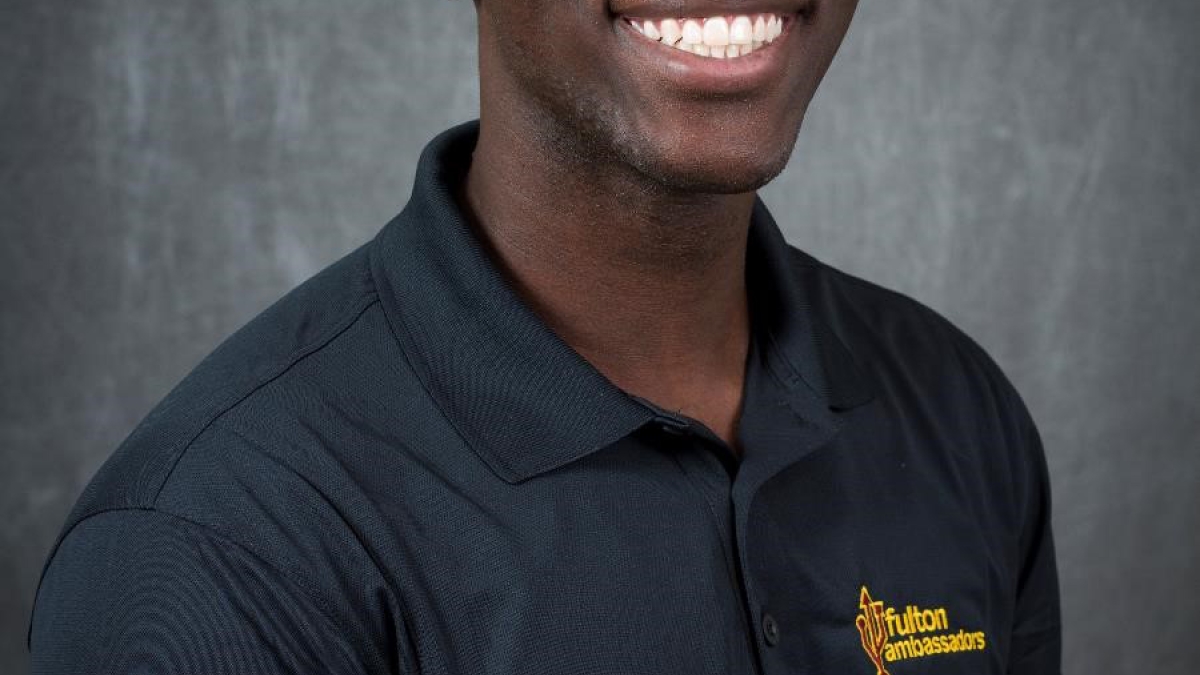Civil engineering grad impacts environmental, diversity challenges

Civil engineering (environmental engineering) graduate Edward Apraku.
Editor's note: This story is part of a series of profiles of notable spring 2021 graduates.
Growing up in Gilbert and Queen Creek, Edward Apraku was steeped in road construction along the Arizona freeway system. This led him to choose a civil engineering major at Arizona State University to support his interest in transportation systems.
A sophomore-year research experience at the University of Massachusetts Boston introduced him to the environmental side of civil engineering through a project analyzing increased pollution in Boston Harbor from stormwater runoff.
“Even though I knew absolutely nothing about environmental hydrology, I found myself fascinated with learning about containment and sediment transport,” says Edward, who ended up winning first place in the poster competition of the UMass Boston summer research symposium.
This led him to additional research and projects that strengthened his interest in environmental engineering. These included the Fulton Undergraduate Research Initiative, the ASU/NASA Space Grant program, Engineering Projects in Community Service and additional summer research at Stanford University funded by the National Science Foundation where he studied emissions from wastewater treatment systems.
Edward was highly involved in the ASU chapter of the American Society of Civil Engineers, serving as undergraduate student government liaison, conference coordinator, vice president and president throughout his time. Most recently, he led the ASU Concrete Canoe team to third place out of 18 universities at the student-led 2021 ASCE Pacific Southwest Conference. He is also a member of Tau Beta Pi, Chi Epsilon and the School of Sustainable Engineering and the Built Environment Ambassadors.
The New American University Scholarship recipient has also been interested in cultivating diversity in STEM, something he did as an engineering residential community assistant and as a Fulton Ambassador.
“Being Black in engineering is important because there has to be more diversity within the field for both younger students to be exposed to careers and for research and development to progress through diverse perspectives,” Edward says.
In engineering, graduate school and diversity issues, Edward has been profoundly impacted by his mentors, Lecturer Mackenzie Boyer and Assistant Professor Otakuye Conroy-Ben, who is also an underrepresented minority in STEM.
“They helped me navigate these daunting topics and grow as a person and researcher,” Edward says. “Dr. Conroy-Ben also advocated heavily for BIPOC (Black, Indigenous and people of color) students and communities through her research with Indigenous tribes. Her work heavily resonated with me and my goal of learning about water quality and the epidemiological issues that stem from it to help those in my home country of Ghana.”
This fall, Edward will begin graduate studies to obtain a doctoral degree in environmental engineering with a focus in environmental microbiology or biotechnology at Stanford University with the support of a 2021 National Science Foundation Graduate Research Fellow award.
Eventually, he wants to become a professor to “teach the next generation of engineers while becoming an inspiration for young engineers of color who may feel left out.”
“I plan to become skilled in the subject of water quality and the epidemiological issues that stem from it,” he says. “I will ensure that my lab both conducts cutting-edge research and promotes diversity in order to strengthen the confidence of future STEM leaders.”
Read about other exceptional graduates of the Fulton Schools’ spring 2021 class here.
More Science and technology

Breakthrough copper alloy achieves unprecedented high-temperature performance
A team of researchers from Arizona State University, the U.S. Army Research Laboratory, Lehigh University and Louisiana State…

4 ASU researchers named senior members of the National Academy of Inventors
The National Academy of Inventors recently named four Arizona State University researchers as senior members to the prestigious…

Transforming Arizona’s highways for a smoother drive
Imagine you’re driving down a smooth stretch of road. Your tires have firm traction. There are no potholes you need to swerve to…

